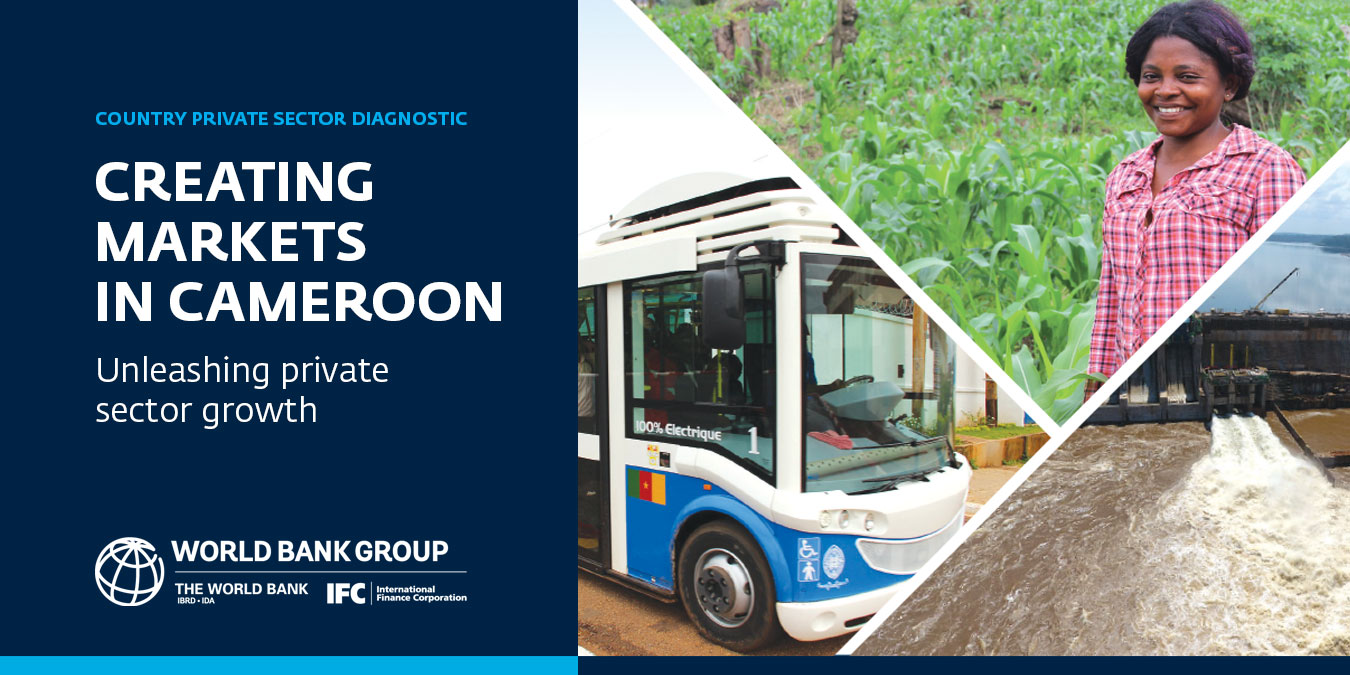
Douala, Cameroon, December 7, 2022—Cameroon can develop new sources of economic growth and spur development by increasing private sector participation in its transport, banking, and other sectors, diversifying its agribusiness sector, and seizing opportunities offered by urbanization, according to a report published today by IFC and the World Bank.
The Cameroon Country Private Sector Diagnostic (CPSD) takes an in-depth look at private sector challenges and opportunities in Cameroon and provides a roadmap for how the country can create a more conducive environment for growth, investment, and job creation. The report aligns with Cameroon's 2021-2030 national development strategy (NDS30), which recognizes the need for the private sector to be the country's main engine of economic growth.
The CPSD's main findings highlight the need for Cameroon to reduce current high levels of public sector participation across the economy, which will increase private investment and productivity. The CPSD also highlights the potential benefits of agricultural diversification, with significant opportunities to be found in cocoa, palm oil, and banana production.
The report comes as Cameroon is recovering from the impacts of COVID-19, but is grappling with new challenges, including rising inflation and increased prices of staple goods.
"Cameroon has a bold vision of emergence and prosperity by 2035. Achieving this vision will require a paradigm shift in empowering private investors, at home and from abroad. This is already articulated in the National Development Strategy 2021-2030 which points to how jobs and economic transformation will be led by the private sector. The CPSD will help accelerate that transformation," said Abdoulaye Seck, World Bank Country Director for Cameroon.
"A stronger private sector will help Cameroon better harness its natural resource endowments and generate more economic opportunities for its growing population," said Sylvain Kakou, IFC Country Manager for Cameroon. "The CPSD is designed to help redefine the country's economic model by promoting business-friendly reforms, catalyzing investment, and creating resilient markets amid a difficult macroeconomic context."
Paired with the right policy measures, the CPSD also notes that increased private investment in education, construction, real estate, the digital economy, and commerce will support growth and development in Cameroon's swiftly expanding major cities, where much of Cameroon's future wealth will be generated.
In line with the CPSD's findings, the World Bank Group's strategy for Cameroon aims to generate opportunities to improve digital infrastructure, support domestic value chains, particularly in the agricultural sector, improve MSMEs access to finance and address infrastructure needs for an increasingly urban population.
The Cameroon CPSD can be downloaded here in French and English.
About the Country Private Sector Diagnostic
Launched in 2017 as a corporate priority, the World Bank Group's Country Private Sector Diagnostics support the institution's strategic focus on expanding private investment and leveraging private solutions to address development challenges in client countries. The diagnostics assess critical constraints to private sector engagement and identify policy and regulatory reforms needed to unleash private sector growth. They are jointly delivered by IFC and the World Bank. For more information, visit www.ifc.org/cpsd.
About IFC
IFC—a member of the World Bank Group—is the largest global development institution focused on the private sector in emerging markets. We work in more than 100 countries, using our capital, expertise, and influence to create markets and opportunities in developing countries. In fiscal year 2022, IFC committed a record $32.8 billion to private companies and financial institutions in developing countries, leveraging the power of the private sector to end extreme poverty and boost shared prosperity as economies grapple with the impacts of global compounding crises. For more information, visit www.ifc.org.
About the World Bank Group
The World Bank Group plays a key role in the global effort to end extreme poverty and boost shared prosperity. It consists of five institutions: the World Bank, including the International Bank for Reconstruction and Development (IBRD) and the International Development Association (IDA); the International Finance Corporation (IFC); the Multilateral Investment Guarantee Agency (MIGA); and the International Centre for Settlement of Investment Disputes (ICSID). Working together in more than 100 countries, these institutions provide financing, advice, and other solutions that enable countries to address the most urgent challenges of development. For more information, please visit www.worldbank.org, www.miga.org, and www.ifc.org.
Stay Connected
Contacts
Stay Informed
Sign up to have customizable news & updates sent to you.